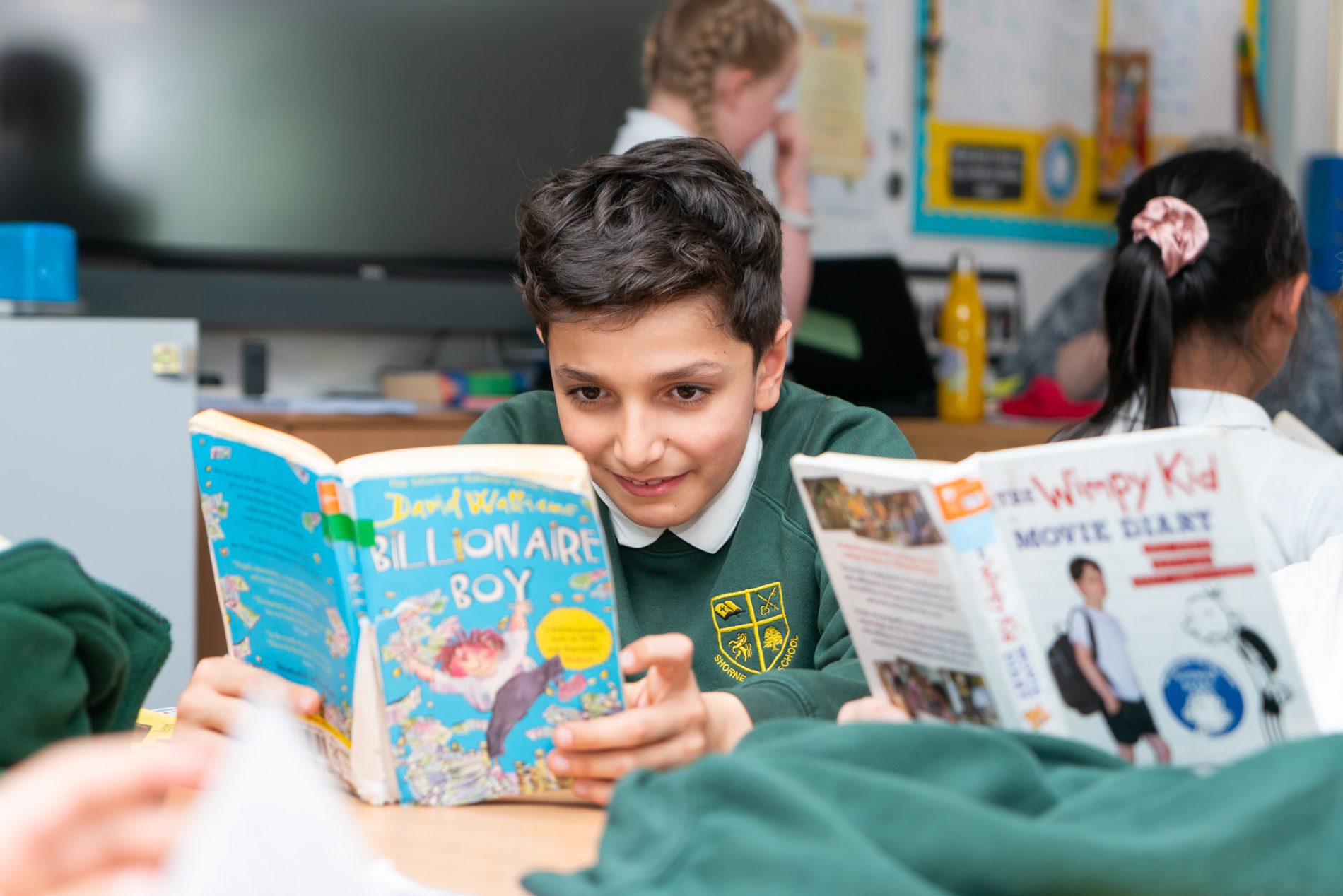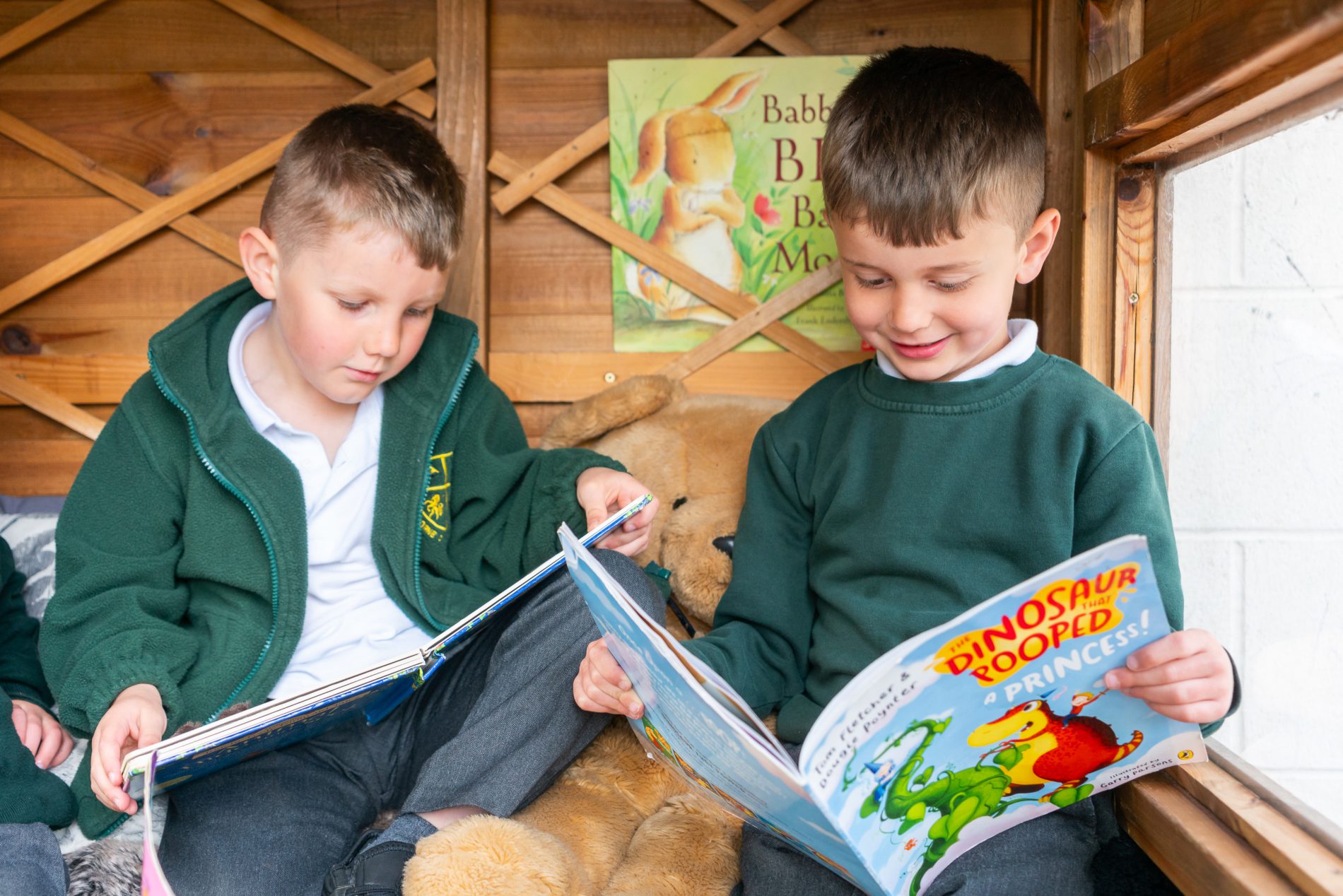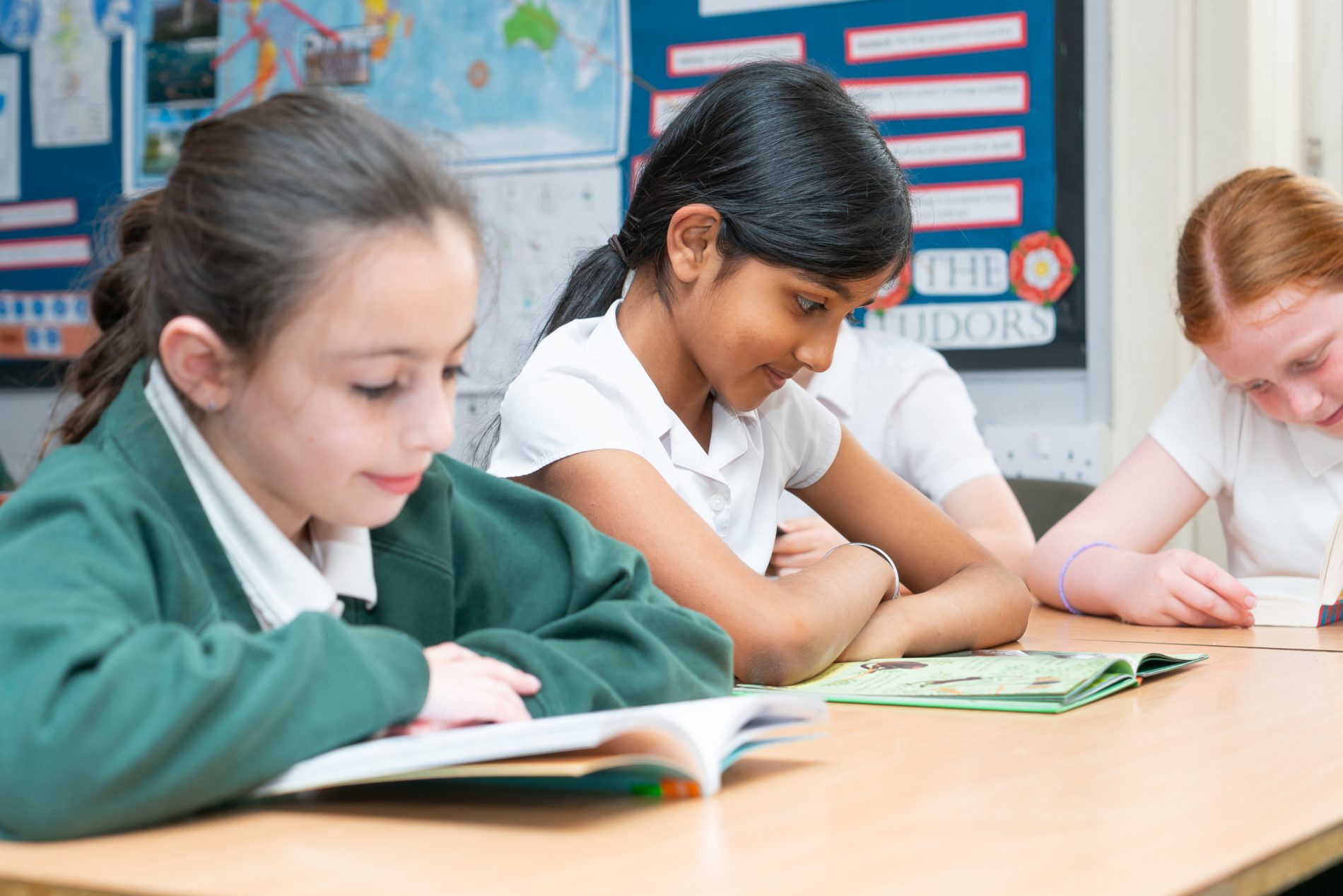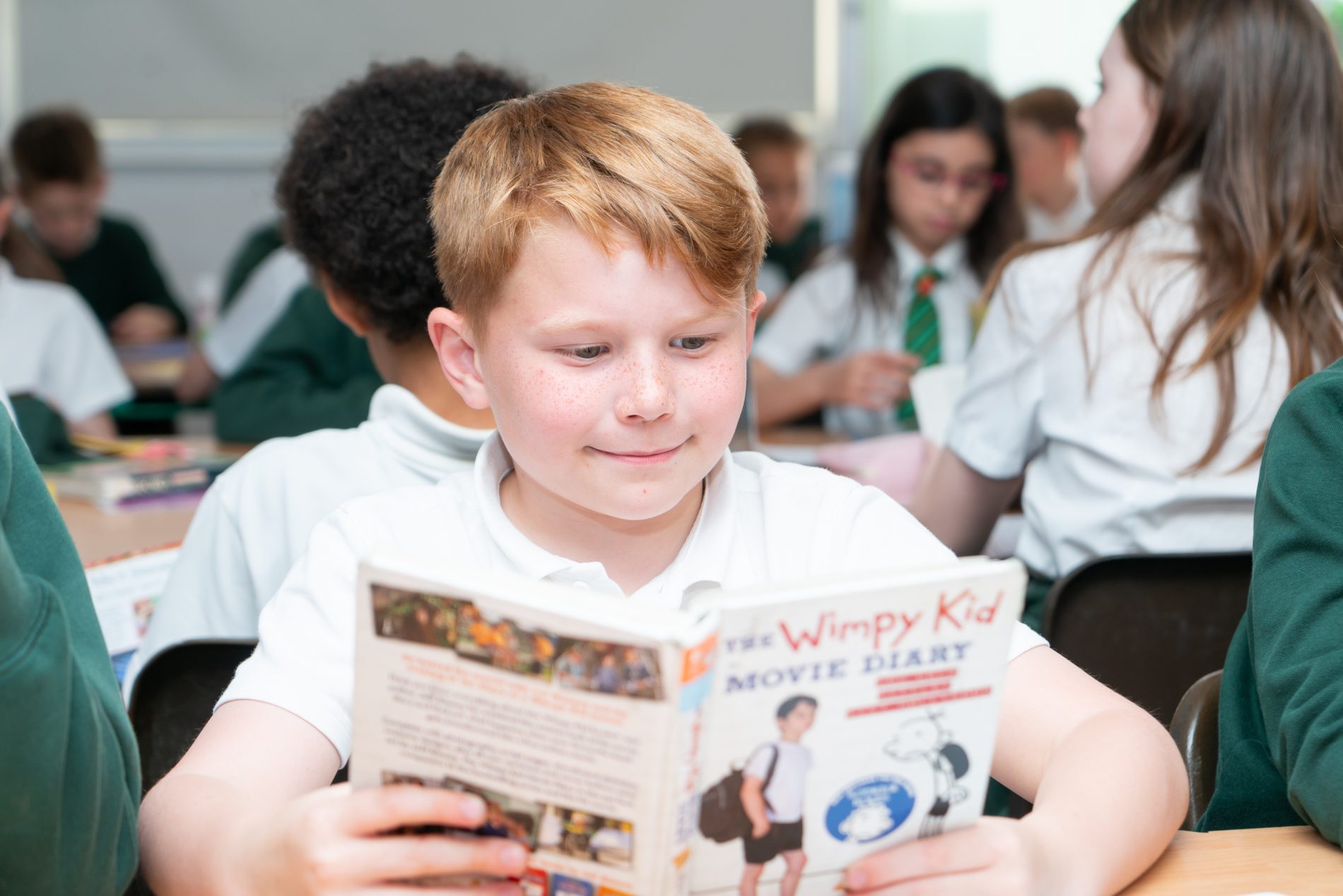English Reading Subject Leader: Miss L Whitbread
At Shorne Church of England Primary School, English reading is given top priority and is a key driver for our curriculum.
Intent
At Shorne School, we intend to create confident readers who develop stamina for reading throughout the school. We aim for all of our children to be independent readers, building on a range of skills as they work through each journey of reading and for them to be able to read for a range of purposes and audiences. Children learn the full range of reading skills needed to be a proficient and fluent reader, and be exposed to a range of text types to develop an appreciation for the diversity of our world, building essential cultural capital to support future opportunities.


Implementation
Throughout their reading journey, we ensure the children are immersed in a range of genres and have a clear understanding of purpose. Our children will have a secure understanding of the purpose of a text type, the intended impact of writing skills/tools and the ability to carefully select vocabulary with careful attention to the desired effect on the readers’ thoughts and feelings. All pupils develop the following reading skills throughout their school journey: Word Reading, Prosody, Retrieval, Inference, Vocabulary, Prediction, Summarising,
In EYFS and KS1, and also for pupils who need additional reading support in KS2, we use the Little Wandle Letters and Sounds Revised early reading scheme. As part of this scheme, pupils engage in small group reading sessions, including ‘keep-up’ sessions, which develop word reading, comprehension and prosody and increase reading fluency for children.
We use the Accelerated Reading (AR) scheme for years 2 – 6. This scheme enables pupils to enjoy reading books by popular authors at a level which is tailored to them and established using online reading diagnostic software called STAR Reading. Pupils read their books, then take an online comprehension quiz, developing their retrieval and vocabulary skills whilst providing useful assessment information to support teachers and families.
Impact
Children become well-rounded and confident readers as a result of a progressive and structured approach to the teaching and learning of reading during their time at Shorne C of E Primary School. They are challenged and encouraged to take risks and view mistakes as part of the learning process. Children at Shorne enjoy reading and it becomes a skill that enhances all aspects of their learning.

Accelerated Reader
We use Accelerated Reader (AR), an online research-proven reading practice system that develops children’s comprehension skills and provides useful assessment information for teachers and families. AR uses a computer programme to help manage and monitor children’s independent reading practice. As part of this, children complete a Star Test on the computer each term which gives them a reading level to read within. This enables children to choose a book at their own level. When they have finished their chosen book, they take a short comprehension quiz on the computer. Passing the quiz is an indication that they have understood what they have read. AR gives children, teaching staff and parents feedback on quiz results. Teachers can use this to help set goals and direct ongoing reading practice.
Children using AR choose their own books to read, rather than having one assigned to them. It guides children to choose books at an appropriate readability level that is challenging without being frustrating. This helps to ensure that each child can pass the quiz and experience both challenge and success. For more information, please see the Accelerated Reader Parents guide.


English Reading in Each Stage
Reading is taught using the Little Wandle Revised Letters and Sounds phonics scheme. It focuses on both word reading, through the teaching of systematic phonics, comprehension through a range of reading skills, including retrieval, inference and vocabulary, and prosody, which includes intonation and expression when reading aloud. We work with parents to support our children in learning to read, and provide workshops and reading cafés so that parents can come in to work with their children, supported by our EYFS teaching team.
Children who are at the expected level at the end of Year R are able to say a sound for each letter in the alphabet and at least 10 digraphs. Be able to read words consistent with their phonic knowledge by sound-blending. Be able to read aloud simple sentences and books that are consistent with their phonic knowledge, including some common exception words. They will also be able to demonstrate understanding of what has been read to them by retelling stories and narratives using their own words and recently introduced vocabulary; anticipate – where appropriate – key events in stories; and use and understand recently introduced vocabulary during discussions about stories, non-fiction, rhymes and poems and during role-play.
For more recommended reading, please visit the EYFS Class page
To read our Phonics and Early Reading Policy, please visit the policy page.
Pupils will be able to join in with simple rhymes and phrases from traditional tales. They will be able to retell the beginning, middle and end of stories and find information in simple non-fiction texts. They will be able to make comments about what they have read and answer questions such as ‘What do you think might happen next?” Pupils will use their knowledge of phonics to segment and blend words and read books to build up their fluency, confidence, understanding and enjoyment. They will read words containing the suffixes -s, -es, -ing, -ed, -er and -est and begin to understand the use of the apostrophe for the omission.
Pupils will talk about books that are read aloud to them and discuss their thoughts about the events and what may happen next. They will begin to recognise the features of non-fiction books (e.g. illustrations, headings, contents and index) and use these to find information. They will retell stories using familiar story structures and language, such as ‘Once upon a time’ and learn simple poems by heart. With adult support, they will begin to use dictionaries and thesauruses to find the meanings of new words. Pupils will use their growing phonic knowledge to read familiar and unfamiliar words and words containing the suffixes -ing, -ed and -ful. They will be involved in choosing their own reading books and building up their fluency, confidence, understanding and enjoyment.
Pupils will listen to and discuss a wide range of fiction (including poetry and plays) and non-fiction texts. They will be able to retell fairy stories and myths and legends and talk about a character’s thoughts, actions and feelings. Pupils will be able to identify adjectives and adverbs and use dictionaries and thesauruses to find the meanings of new words. Pupils will begin to self-correct reading errors using their knowledge of phonics and spelling patterns. They will begin to recognise different forms of poetry (e.g. acrostic, calligram, kenning and free verse).
Pupils will confidently recite poems by heart and participate in discussions about books. They will be able to use evidence from the text to answer questions about a character or setting and to give their opinion. Pupils will summarise the main ideas, giving key details, which include some quotations and references to the text. They will read aloud fluently with confidence and expression. Pupils will confidently make their own book choices, considering challenges and preferences whilst widening their range of reading to include new authors and a range of genres.
English Reading Progression
When progressing, young readers will, at a certain stage, successfully make the leap into their first chapter of books. To help pupils to pick a selection of short, illustrated chapter books that are perfect for children launching into independent reading, please click here.
Assessments
- Alongside ongoing teacher assessment during reading lessons, pupils in Years 1-6 take internal formal reading tests 2 times per year using NTS papers, published by Rising Stars.
- In EYFS, statutory assessment of reading takes place at the end of the academic year using the Early Learning Goals. In Year 1, pupils take the statutory Phonics Screening Check in June.
- In Years 2 and 6, pupils sit statutory national tests for reading in May, known as the KS1 and KS2 SATs. The results of these tests for Year 2 and Year 6 pupils are reported nationally and are also shared with parents.
- Pupils in Years 2-6 also engage with Star Reader tests as part of Accelerated Reader, to identify their book levels and track reading progress.
SEND Information
Interventions, support, and challenges are constantly revised and adapted to ensure all children are supported in achieving learning. Learning is robustly and continuously monitored and assessed to ensure gaps in learning are addressed. Teachers and support staff offer adaptive teaching to enable access for all, and may provide scaffolds, pre-teaching, and other support and intervention, as outlined in the Kent Mainstream Core Standards. Pupils may also be supported to access learning through the use of Clicker software.

